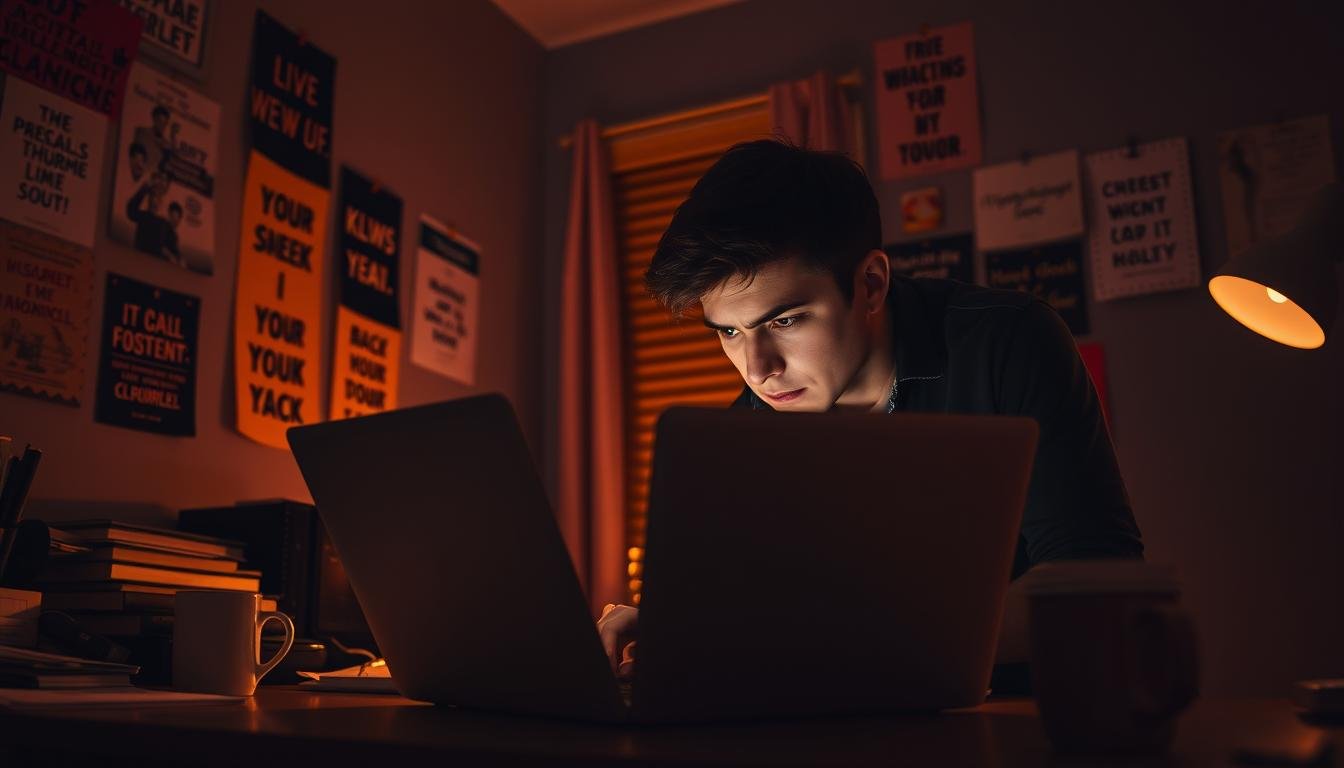Procrastination is a universal challenge, affecting nearly 75% of college students. It’s not just about poor time management. It’s an irrational delay, even when we know the consequences. For example, choosing to watch TV instead of writing a blog post highlights the battle between immediate gratification and long-term rewards.
This habit impacts mental health, academic performance, and relationships. In Western cultures, procrastination often stems from fear of failure, while non-Western cultures may delay tasks due to external pressures. Understanding these dynamics is the first step to overcoming procrastination.
This article explores why we procrastinate and offers practical strategies to stop procrastinating. From time management techniques to the “temptation bundling” method, you’ll find actionable tips to reclaim your productivity.
Key Takeaways
- Procrastination affects 75% of college students, making it a widespread issue.
- It’s more than poor time management; it’s an irrational delay despite negative outcomes.
- Immediate rewards often outweigh long-term benefits, leading to delays.
- Cultural differences influence motivations for procrastination.
- Effective strategies like “temptation bundling” can help overcome this habit.
What is Procrastination?
Delaying tasks despite knowing the consequences is a behavior many struggle with. This tendency, often rooted in human psychology, goes beyond simple laziness. It’s a voluntary delay, even when we expect worse outcomes. Research shows that 70% of university students identify as procrastinators, highlighting its prevalence.
The term originates from Latin, combining “pro-” (forward) and “crastinus” (of tomorrow). This delay isn’t always intentional. Sometimes, it’s driven by the inability to resist immediate distractions. Studies on pigeons even reveal that procrastination exists in animal behavior, suggesting evolutionary roots.
Defining Procrastination
Academically, procrastination is defined as a voluntary delay despite expecting negative consequences. It’s counterproductive, needless, and often leads to stress. Unlike strategic delays, which are planned, procrastination is impulsive and self-defeating.
Behavioral economics offers insights through Steel’s temporal motivation theory. This theory explains how the balance between task value, expectancy, and impulsiveness influences our actions. When immediate rewards outweigh long-term benefits, procrastination becomes more likely.
Procrastination vs. Laziness
Procrastination is often mistaken for laziness, but they’re distinct. Laziness involves avoiding work altogether, while procrastinators actively seek distractions. For example, someone might clean their house instead of completing a work project. This behavior reflects a desire to escape discomfort rather than a lack of effort.
Understanding these differences is crucial. Procrastination is a complex problem influenced by genetics, environment, and cognitive biases. Twin studies show shared genetic factors linking impulsivity and procrastination, further emphasizing its psychological depth.
The Psychology Behind Procrastination
The brain’s role in procrastination reveals why we often choose short-term rewards. This behavior isn’t just about poor time management; it’s deeply tied to how our minds work. Self-regulation plays a key part. When the prefrontal cortex, responsible for executive functions, is weak, it becomes harder to resist distractions.
Research shows that 52% of students struggle with this issue, often due to cognitive distortions. A Vermont study identified four common thought patterns: overestimating available time, expecting future motivation, underestimating task duration, and waiting for the “right mood.” These biases lead to unnecessary delays.
Self-Regulation and Procrastination
Effective self-management is crucial for overcoming delays. When we fail to regulate our actions, immediate gratification often wins. For example, watching TV instead of working on a blog post reflects this imbalance. The 2019 Rinaldi study found measurable cognitive impairments in chronic procrastinators, linking these struggles to brain function.
The Role of Cognitive Biases
Our thoughts often deceive us. Perfectionism, for instance, can create decision paralysis. The fear of not meeting high standards leads to avoidance. Emotional coping mechanisms, like descending counterfactuality (“Others have it worse”) or valorization (“Look what I achieved instead”), further reinforce this behavior.
Understanding these cognitive biases is essential. They highlight why procrastination is more than laziness—it’s a complex interplay of psychology, anxiety, and flawed thinking patterns. Addressing these issues can pave the way for better habits and improved productivity.
Why Do We Procrastinate?
Understanding the reasons behind procrastination can help us tackle it effectively. It’s not just about laziness or poor time management. Many factors, from fear to emotional avoidance, play a role in this behavior. Let’s explore the key reasons why we delay tasks.
Fear of Failure and Perfectionism
One major reason for procrastination is the fear of failure. Many people avoid starting tasks because they worry about not meeting expectations. Perfectionism amplifies this fear, creating a cycle of avoidance. For example, students might delay writing papers, fearing their work won’t be good enough.
This behavior is common in high-pressure environments. Studies show that 46% of students chronically procrastinate on academic tasks. Addressing this fear is crucial for breaking the cycle of delay.
Present Bias and Immediate Gratification
Our brains are wired to prioritize immediate rewards over long-term benefits. This present bias makes it hard to focus on tasks with delayed outcomes. Watching a TV show feels more rewarding in the moment than working on a project due next week.
Smartphone addiction exacerbates this issue. Constant notifications and entertainment options make it easier to choose short-term distractions. Breaking this cycle requires conscious effort and better self-regulation.
Emotional Avoidance
Procrastination often serves as a way to avoid uncomfortable feelings. Tasks that trigger stress or anxiety are more likely to be delayed. For instance, someone might avoid a difficult conversation or a challenging project to escape negative emotions.
Cultural differences also influence this behavior. In Western cultures, people may procrastinate to avoid performance decline, while in Eastern cultures, peer judgment plays a bigger role. Recognizing these patterns can help in developing strategies to overcome procrastination.
Types of Procrastinators
Not all procrastinators are the same; their behavior varies based on motivations and habits. Understanding these differences can help identify personalized strategies to overcome delays. Let’s explore the main categories of procrastinators and what drives their actions.
Passive vs. Active Procrastinators
Passive procrastinators delay tasks due to indecision or fear. They often feel overwhelmed and struggle to start. On the other hand, active procrastinators intentionally delay tasks to work better under pressure. They thrive on the challenge of meeting tight deadlines.
Research shows that active procrastinators often perform well despite their delays. However, passive procrastinators face more stress and lower productivity. Recognizing which type you are can guide you toward better time management techniques.
Perfectionists, Dreamers, and Crisis-Makers
Perfectionists delay tasks because they fear their work won’t meet high standards. Dreamers procrastinate by focusing on big ideas but avoiding the steps to achieve them. Crisis-makers, on the other hand, intentionally wait until the last minute to feel the rush of meeting a deadline.
Other types include overdoers, who take on too much and struggle to prioritize, and worriers, who avoid tasks to stay in their comfort zone. Defiers reject external schedules, preferring to work on their own terms. Understanding these classifications can help you identify your habit patterns and find ways to improve.
In Hungarian culture, the folk figure Pató Pál symbolizes procrastination, often depicted as someone who delays tasks indefinitely. This cultural reference highlights how procrastination is a universal challenge, even in folklore.
Non-procrastinators, in contrast, exhibit high levels of conscientiousness. They plan ahead, stay organized, and rarely delay tasks. By studying these traits, we can learn valuable lessons to reduce procrastination in our own lives.
The Impact of Procrastination
Chronic procrastination creates a domino effect, influencing both personal and professional success. This behavior doesn’t just delay tasks—it leads to measurable consequences in mental health, academic performance, and workplace productivity. Understanding these impacts can motivate individuals to address this problem effectively.
On Mental Health and Stress
Procrastination takes a toll on mental well-being. Chronic cases show 2.4x higher stress levels compared to non-procrastinators. This heightened stress can lead to anxiety, depression, and even physical health issues. For example, studies reveal that procrastinators report 58% more cold and flu episodes due to weakened immune systems.
Emotional avoidance often fuels this cycle. By delaying tasks, individuals temporarily escape discomfort, but the long-term effects are damaging. Addressing this behavior is crucial for maintaining mental and physical health.
On Academic and Professional Performance
In academic settings, procrastination significantly affects grades. Research shows that 1/3 of final exam score variance is tied to this behavior. On average, procrastinators have GPAs 0.5 points lower than their peers. This gap highlights the academic consequences of delayed tasks.
In the workplace, the impacts are equally severe. Missed deadlines can lead to missed promotions, damaged reputations, and financial penalties like late fees or tax issues. Teams may also experience resentment when one member’s delays affect group projects.
Cultural factors play a role too. Studies by Yang and Yu show that collectivist societies often face unique pressures, where peer judgment amplifies the problem. Recognizing these dynamics can help individuals and organizations develop tailored solutions.
Procrastination and Mental Health Conditions
Mental health conditions often amplify the tendency to delay tasks, creating a cycle of avoidance. These challenges can make it harder to start or complete tasks, even when the consequences are clear. Understanding this connection is key to finding effective solutions.
Depression and Procrastination
Depression significantly impacts motivation and energy levels, making it difficult to tackle tasks. Studies show that 40% of depressed patients report severe procrastination. This behavior stems from a lack of energy and the overwhelming nature of responsibilities.
Perfectionism, often linked to depression, can also lead to decision paralysis. The fear of not meeting high standards creates a barrier to starting tasks. Addressing these thoughts and seeking professional help can break this cycle.
ADHD and Procrastination
ADHD is another condition closely tied to procrastination. Individuals with ADHD often struggle with distractibility and task aversion. Working memory challenges make it harder to prioritize and stay focused on long-term goals.
Research highlights that ADHD-related procrastination is not just about laziness but a genuine struggle with self-regulation. Tailored strategies, like breaking tasks into smaller steps, can help improve ability to manage responsibilities.
If procrastination persists and affects daily life, it may be time to seek professional help. The DSM-5 provides guidelines for diagnosing conditions like depression and ADHD. Screening questions can help identify comorbid conditions and guide treatment options.
Cultural motivations also play a role. The Dekker/Fischer meta-analysis shows how societal pressures influence procrastination behaviors. Recognizing these factors can lead to more personalized and effective solutions.
Common Excuses for Procrastination
Many people justify delaying tasks with common excuses, but these reasons often mask deeper issues. Whether it’s waiting for the “right mood” or claiming to perform better under pressure, these justifications can become self-sabotaging habits. Let’s explore some of the most frequent excuses and why they don’t hold up.
“I Work Better Under Pressure”
This excuse is a favorite among chronic procrastinators. The belief that pressure enhances performance is a myth. Studies show that last-minute work often leads to lower quality and increased stress. For example, 65% of students want to reduce paper-writing delays, yet they still fall into this trap.
Productivity research debunks the idea that tight deadlines improve focus. Instead, they create unnecessary anxiety and reduce the ability to think clearly. Breaking tasks into smaller steps is a more effective way to manage time and avoid the pitfalls of this excuse.
“I’m Not in the Right Mood”
Waiting for the perfect moment to start a task is another common excuse. However, research shows that motivation often follows action, not the other way around. The “mood dependency” myth has been debunked by studies emphasizing the importance of starting, even when you don’t feel ready.
For instance, Pogorskiy’s analysis of web navigation patterns reveals that task-switching is a major productivity killer. Instead of waiting for inspiration, taking the first step can create momentum and make the task feel less daunting.
Other excuses, like “I need more research time,” often stem from perfectionism or fear of failure. Steel’s equation—(Expectancy x Value)/(Impulsiveness x Delay)—explains how these factors influence our behavior. By addressing these underlying reasons, we can develop healthier habits and stop procrastinating.
Strategies to Overcome Procrastination
Overcoming delays requires actionable strategies tailored to individual needs. By addressing the root causes and implementing practical techniques, you can reclaim your productivity and reduce stress. Here are some proven methods to help you stop procrastinating and stay focused on your goals.
Breaking Tasks into Smaller Steps
One of the most effective ways to tackle procrastination is by breaking large tasks into smaller, manageable steps. This approach reduces overwhelm and makes it easier to start. For example, instead of writing an entire report in one sitting, focus on completing one section at a time.
The 2-minute rule is another helpful technique. If a task takes less than two minutes, do it immediately. This builds momentum and encourages progress. Creating a list of micro-goals, such as achieving 1% daily progress, can also keep you motivated and on track.
Eliminating Distractions
Distractions are a major barrier to productivity. To stay focused, identify and eliminate common interruptions. Use app blockers like Freedom or Cold Turkey to limit access to distracting websites and apps during work hours.
Designate a specific workspace free from clutter and noise. This helps create a mental boundary between relaxation and productivity. By minimizing distractions, you can maintain focus and complete tasks more efficiently.
Using Time Management Techniques
Effective time management is key to overcoming procrastination. The Pomodoro Technique, which involves working in 25-minute intervals followed by short breaks, can boost focus and prevent burnout. This method is particularly useful for large projects with tight deadlines.
The Eisenhower Matrix is another valuable tool. It helps prioritize tasks based on urgency and importance, ensuring you tackle the most critical items first. By organizing your schedule and setting clear priorities, you can reduce the pressure of last-minute rushes.
Cultural adjustments, such as those highlighted in Liem and Nie’s research, can also enhance these strategies. Tailoring techniques to fit personal and cultural contexts increases their effectiveness and long-term success.
The Role of Goal Setting in Beating Procrastination
Effective goal setting can transform how you approach tasks and reduce delays. By defining clear objectives, you create a roadmap that minimizes distractions and maximizes productivity. Studies show that SMART goals reduce procrastination by 38%, making them a powerful tool for overcoming delays.
Setting SMART Goals
SMART goals—Specific, Measurable, Achievable, Relevant, and Time-bound—provide a structured way to tackle tasks. For example, instead of saying, “I’ll write a blog post,” set a goal like, “I’ll write 200 words by 3 PM today.” This clarity eliminates ambiguity and makes it easier to take action.
Implementation intentions are another effective strategy. These are “if-then” plans, such as, “When I finish my morning coffee, I’ll start working on my report.” This approach reduces decision fatigue and helps you stay on track.
Prioritizing Tasks Effectively
Prioritization is essential for managing your time and effort. The ABCDE method is a simple yet powerful way to organize tasks. Start by Assessing your list, Brainstorming priorities, Choosing the most critical task, Doing it, and Evaluating your progress.
Anti-goals can also help. These define what you want to avoid, such as late fees or missed deadlines. By focusing on both positive and negative outcomes, you create a balanced approach to task management.
In the workplace, project milestone mapping ensures that large tasks are broken into manageable steps. This strategy aligns with Wolters’ mastery-approach orientation, which emphasizes learning and growth over avoiding failure.
Building Habits to Avoid Procrastination
Developing consistent habits is a proven way to combat delays and boost productivity. By creating routines, you can reduce stress and stay focused on your goals. Research shows that forming a habit takes about 21 days, and this process can reduce procrastination relapse by 41%.
The Power of Routine
Morning rituals are a great way to start your day with purpose. For example, dedicating the first hour to high-priority tasks can set a productive tone. Students with fixed study schedules report 67% lower anxiety, proving the value of structure.
Habit stacking is another effective strategy. Attach new habits to existing ones, like reviewing your to-do list after breakfast. This approach makes it easier to integrate positive behaviors into your daily life.
Rewarding Progress
Rewards can reinforce good habits and keep you motivated. Use a token economy system, where you earn small rewards for completing micro-tasks. This method encourages consistent progress and makes the process enjoyable.
Tools like Habitica and Streaks can help track your habits and celebrate milestones. These apps turn habit formation into a game, making it easier to stay committed. By focusing on small wins, you can build momentum and achieve long-term success.
Conclusion
Breaking the cycle of delay starts with understanding its roots and taking small, actionable steps. With 75% of students affected and a 0.5 GPA impact, procrastination is a widespread challenge. Addressing it requires a multi-method approach, combining cognitive restructuring with habit change.
Chronic patterns can lead to financial and health risks, making it essential to act early. For those struggling with ADHD or depression, seeking professional help is crucial. Cultural competence in intervention strategies ensures solutions are tailored to individual needs.
Start today with the “5-minute start” technique. Commit to working on a task for just five minutes—it’s often enough to build momentum. For further support, explore resources like books, apps, and therapy options. Small changes can lead to big improvements in your life and work.
FAQ
How is procrastination different from laziness?
Procrastination involves delaying tasks despite knowing the consequences, often due to anxiety or fear. Laziness, on the other hand, is a lack of effort or motivation to act at all.
What role does fear of failure play in procrastination?
Fear of failure can paralyze individuals, making them avoid tasks to escape potential judgment or disappointment. This often leads to procrastination as a coping mechanism.
Can procrastination affect mental health?
Yes, chronic procrastination can increase stress, anxiety, and feelings of guilt. Over time, it may contribute to more severe mental health issues like depression.
What are some effective strategies to stop procrastinating?
Breaking tasks into smaller steps, eliminating distractions, and using time management techniques like the Pomodoro Method can help overcome procrastination.
How does goal setting help in beating procrastination?
Setting SMART (Specific, Measurable, Achievable, Relevant, Time-bound) goals provides clarity and motivation, making it easier to stay focused and avoid delays.
What are the common types of procrastinators?
Procrastinators can be categorized as passive (avoiding tasks due to indecision) or active (deliberately delaying tasks for a perceived rush). Other types include perfectionists, dreamers, and crisis-makers.
How does procrastination impact academic performance?
Procrastination often leads to rushed work, missed deadlines, and lower grades. It can also increase stress and reduce the quality of learning.
Can ADHD contribute to procrastination?
Yes, individuals with ADHD often struggle with focus and time management, making them more prone to procrastination.
Why do people say they work better under pressure?
Some believe deadlines create urgency, forcing them to focus. However, this often leads to stress and lower-quality outcomes compared to planned efforts.
How can building habits help avoid procrastination?
Establishing routines and rewarding progress can create positive reinforcement, making it easier to stay consistent and avoid delays.







